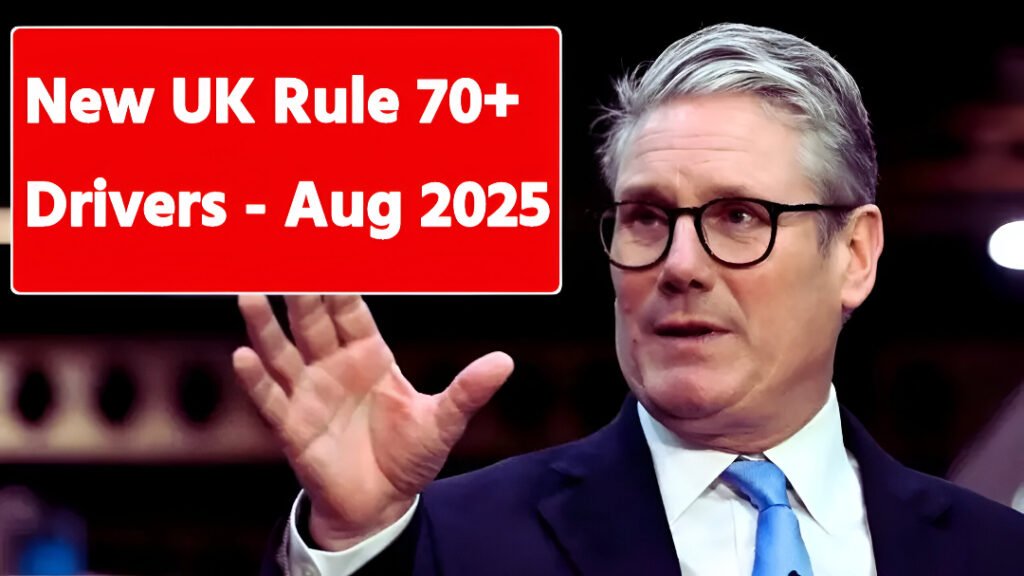Friends, As of August 2025, the UK government has introduced several critical updates to the driving licence rules for people aged 70 and above. These changes aim to improve road safety, address health-related concerns, and simplify the renewal process for elderly drivers. The DVLA (Driver and Vehicle Licensing Agency) now mandates more robust checks and revised timelines for licence renewal. Here’s what senior citizens need to know moving forward.
Why the Change Was Necessary
With a growing elderly population in the UK and increased road usage by senior drivers, the government needed to reassess and modernise policies. Statistically, people over 70 are more prone to vision impairment, slower reflexes, and age-related medical conditions that may impact driving ability. These changes are introduced to ensure both personal safety and public road security.
The New Renewal Age and Timeline
Drivers must now renew their licence every 3 years after turning 70, compared to the previous system of self-declaration every 3 years. The new system includes a mandatory health and vision check as part of the process. The DVLA will send reminders 90 days before the licence expiry.
Mandatory Medical Declaration
All drivers aged 70+ are now legally required to submit a medical declaration form certified by a GP. This includes details about current medications, mental health status, and any diagnosed conditions like Parkinson’s, dementia, or heart disease. This regulation helps the DVLA assess whether the driver is medically fit to continue driving.
Vision Test Requirements
Alongside the medical form, a certified vision test is now compulsory. This test must confirm that the driver can read a number plate from 20 metres away, both with and without glasses. Opticians must be DVLA-approved and send results directly to the agency.
Online Renewal System Enhancements
To simplify the process for older drivers, the DVLA has upgraded its digital services. Seniors can now.
- Upload medical certificates and vision test reports securely
- Track application status in real-time
- Receive automated reminders via email and text
These changes have reduced processing time from 4 weeks to just 7 working days.
Penalties for Non-Compliance
Failing to renew the driving licence after 70 or submitting incomplete/false medical information can lead to serious consequences:
- A fine of up to £1,000
- Immediate revocation of the driving licence
- Possible criminal charges if involved in an accident
It is crucial to follow the updated regulations to avoid such penalties.
Driving with Age-Related Conditions
The DVLA now includes a list of over 100 medical conditions that must be reported by elderly drivers. These include.
- Epilepsy
- Stroke or mini-stroke (TIA)
- Alzheimer’s or other dementias
- Severe arthritis
Important Tips:
- Always consult your GP before renewing your licence
- Keep records of medical visits and prescriptions
Driving Tests for Drivers Aged 85+
New driving assessments may be introduced for drivers aged 85 and above. Although not mandatory for all, certain individuals may be asked to take a short on-road driving evaluation if flagged by their GP or if involved in a recent road incident.
Insurance Implications for Senior Drivers
Insurance providers are now closely evaluating the driving history and health status of elderly drivers. Premiums may be affected by:
- Any declared medical condition
- Past accident records
- Results from the medical and vision test
It’s advisable to shop around for senior-friendly insurance policies.
Public Transport Incentives for the Elderly
To encourage safer mobility, the UK government is offering increased subsidies and free public transport passes for seniors who choose to surrender their driving licences voluntarily. These incentives include:
- Free travel on buses and selected train routes
- Discounts on taxis and community transport services
Eligibility Criteria:
- Must be aged 70+
- Must surrender licence voluntarily via DVLA
DVLA Support and Helplines
The DVLA has set up a dedicated helpdesk for senior drivers. Assistance is available in multiple formats:
- Phone support (Monday to Saturday)
- Online chatbot assistance
- Booklets and guides sent by post upon request
Senior drivers or their family members can also book a one-on-one consultation with a DVLA advisor.
Frequently Asked Questions (FAQs)
Q1. Do I need to renew my licence every year after 70?
No. Under the new rules, drivers must renew every 3 years after turning 70.
Q2. Can I still drive if my renewal is being processed?
Yes, as long as your application is submitted before the expiry date, you’re legally allowed to drive.
Q3. What happens if I fail the vision test?
You may need to use corrective lenses or reapply after treatment. Driving without meeting vision standards is illegal.
Q4. Is the medical form mandatory for all 70+ drivers?
Yes, a GP-certified medical declaration is now a required part of the renewal process.
Q5. Will I have to retake my driving test at 70?
No, unless flagged by a doctor or DVLA officer. However, from age 85+, a short evaluation might be requested.
Q6. Can family members help with the renewal process?
Yes, the online system allows authorised family members to assist seniors in uploading documents and tracking progress.
Q7. Are there any fee waivers for pensioners?
The DVLA has not announced waivers yet, but discounts for certain medical tests and public transport are available.
Conclusion
The updated driving licence rules for 70+ drivers in the UK, introduced in August 2025, mark a significant shift in how elderly road users are assessed and supported. While these changes may seem demanding, they are designed to protect both drivers and the wider public. By embracing the new processes, staying informed, and prioritising health and vision, senior citizens can continue to enjoy the freedom of the road safely and responsibly.
Whether you’re approaching your 70th birthday or helping a loved one navigate these changes, being proactive is the key to staying compliant and confident behind the wheel. For the latest updates, always refer to the official DVLA website.
